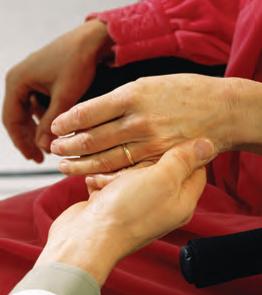Advice for Those Caring for the Elderly
If you are caring for an aging relative or friend, you want to help all you can. You may urge the doctors to try every possible treatment. But as seniors get close to the end of their lives, “quality of life” may be more important than living a little bit longer.
This roundup of medical issues and tips will help you and your loved one make decisions about getting the best care, selecting palliative or hospice care, and approaching death with dignity.
Contents of This Section
How to Talk With Doctors About Specific Medical Issues
When it’s Time for Palliative Care or Hospice Care
A Guide to the End of Life

How to Talk With Doctors About Specific Medical Issues
Consumer Reports has written these short guides to help you talk with doctors about specific tests and treatments that may be offered to the person you’re caring for.
They are based on the Choosing Wisely campaign, a nationwide effort by medical specialists to name the screenings, tests, procedures and drugs that may not be necessary, are used too often, or may even do more harm than good.

Advice for Caregivers: Treatments and Tests for Seniors Some tests and treatments won’t help older adults. They may even be harmful, especially near the end of life.
Alzheimer’s Disease Testing If someone is having memory problems, their doctor should look for other causes before ordering a brain scan.
Antibiotics for Urinary Tract Infections in Older People Many older people get antibiotic treatment for urinary tract infections when they don’t need it.
Care at the End of Life for Advanced Cancer Patients Although it is hard to accept, the best thing for someone may be to stop treatment for the cancer.
Cholesterol Drugs for People Over 75 If a person is age 75 or older and has not had symptoms of heart disease, statins may be a bad idea.
Chronic Kidney Disease Here are four important tests and treatments a patient with kidney disease should carefully discuss with their family and doctor.
Drugs for Rheumatoid Arthritis The older, “non-biologic” drugs are a good first choice for treating rheumatoid arthritis.
Feeding Tubes for People with Alzheimer’s Feeding tubes sometimes do more harm than good for people with Alzheimer’s disease.
Home Oxygen After a Hospital Stay Many people who use long-term home oxygen therapy don’t need it.
Implanted Heart Devices at the End of Life An ICD helps the heart beat normally. But if a person is near death, those shocks can make things worse.
Sleeping Pills for Insomnia and Anxiety in Older People Older adults usually should try other non-drug treatments first, for insomnia and anxiety.
Treating Disruptive Behavior in People with Dementia Powerful antipsychotic drugs should not be the first choice for people with dementia.
When it’s Time for Palliative Care or Hospice Care
Sometimes, medical treatment can be physically and emotionally difficult. Palliative care can help you manage the pain and symptoms of your disease and treatment.
Even with the best treatment though, you, your family and your doctor might decide at some point that aggressive treatment is not likely to help you live longer. Hospice care can help keep you emotionally and physically comfortable toward the end of your life.

Palliative Care With palliative care, a person can get physical, emotional, and spiritual support at any stage of a serious illness. This guide describes its features.
Palliative and Hospice Care This guide explains the differences between palliative and hospice care.
Moments of Life The National Hospice and Palliative Care Organization has created this website to highlight the value of Hospice.
Randi’s Story: Don’t be Afraid to ask the Hard Questions “That is exactly what my dad wanted to avoid. Why would they have scheduled this surgery without listening to him?”
A Guide to the End of Life
Unfortunately, a good death is hard to achieve. That’s why it’s crucial that all Americans think about end-of-life concerns long before a crisis arrives. These Consumer Reports resources are intended to help you and your loved ones approach the end of life with your own needs and desires as the top priorities.
A Beautiful Death Paul Scheier lived a full and loving life. So when his cancer returned at age 86, he said no more hospitals, no chemo. He faced the end on his own terms—something that’s not easy to do in America today. But he showed that it can be done.
How to Talk About End of Life With Your Family The centerpiece of the Conversation Project is a downloadable “conversation starter kit” that you can use to clarify your own end-of-life feelings and begin talking with your loved ones. It even gives suggestions for icebreakers to get the conversation going.
Caring for the Caregiver Caring for an ill or incapacitated family member can exact a toll on your mental and physical health, no matter how devoted you are to the task. But research shows caregivers feel more confident and satisfied when they get emotional and physical support and get the information and training they need.
Regional Variation in Care How cancer patients spend their final days and weeks depends more on where they live and the hospital they go to than their preferences, or those of their caregivers.
Too Much Treatment? Patients treated most aggressively are at increased risk of infections and medical errors that come from uncoordinated care, such as doctors prescribing drugs that duplicate or interact with other drugs. They also tend to receive poorer care, spend a lot more money for co-payments, and are the least satisfied with their healthcare, researchers have found.
